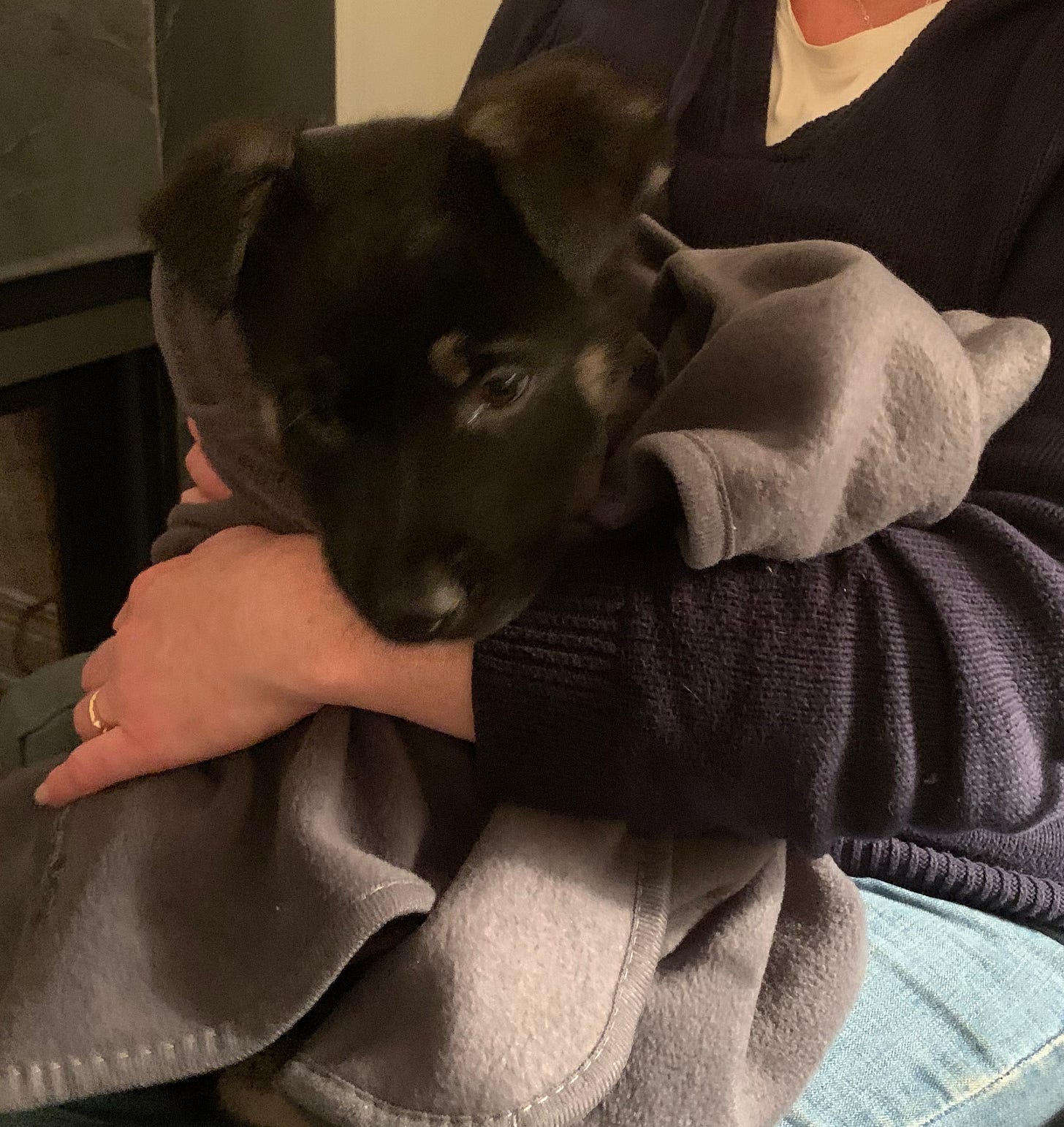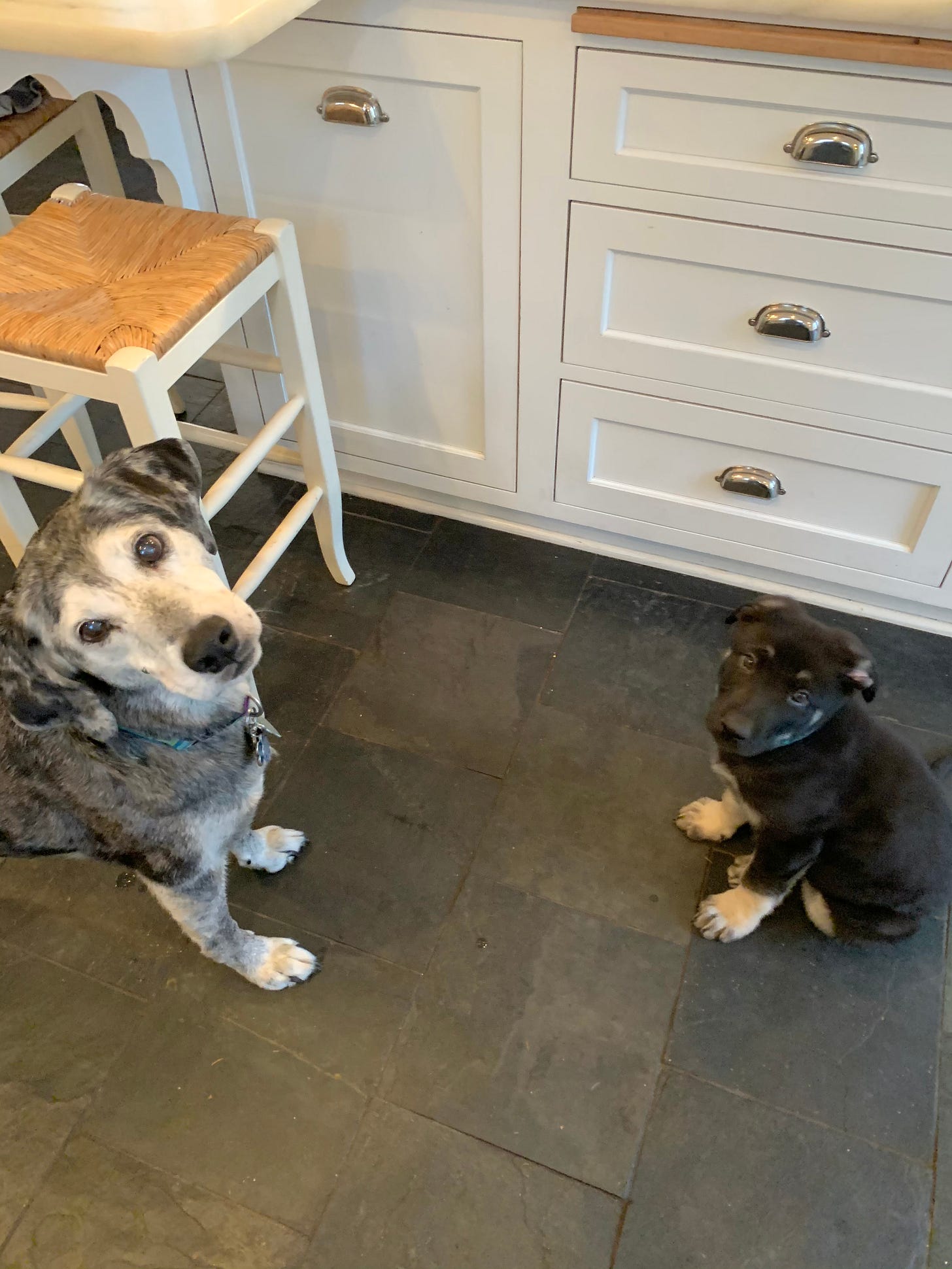Eulogy for (my godmother) Margaret
An excerpt from my book of essays “But Still They Sing”. You can buy it at the links below.
Please note: While I appreciated the many kind messages of condolence I received yesterday, this, and the post from yesterday are reprints from my book published last year. Margaret died during the COVID lockdowns, and while I miss her with all my heart, it would not be accurate to say that I am grieving. But I do want to remember her and to honor her memory. You are all lovely people. Thank you for that.
Yesterday I took a handful of earth and sprinkled it over Margaret’s grave. It’s a ritual whose insight was born in millennia of human grief, giving hard reality to the shock and disbelief of those first days, and forcing confrontation with the black hole of mourning. It was a small outdoor service, with only fourteen of us, and in the midst of wild autumn storms, the rain stopped, and from a deep blue sky the sun shone on the yellow leaves above my home church’s tiny columbarium.
Margaret and I spent time together last week for only the second time since the pandemic. I brought Eli to visit, and we went for a walk. She gave Eli treats. Her daughter texted me that night to say that Margaret was the happiest she had been in a long time; how excited she was about Eli; how beautiful she had found him. I examined my conscience about why I had not gone to see her sooner, but I am still desperately grateful that we had that afternoon.
Margaret Rose was born in Sheffield England in 1930, a contemporary of the princess who shared her name. Sheffield was a manufacturing town, and when the blitz came, it was heavily targeted by the Nazis. She lived with her family in a block of rowhouses, all sharing a wall with the house next door. When the air raids came, the neighbors would crawl through holes in the cellar walls to huddle together, perhaps trying to get the little ones to sleep.
One morning they emerged from their shelter after a night of bombing and found that the other side of the street—identical to their own—had been flattened. Everyone was dead.
Her father packed them up and walked the 3 miles to the bus stop so they could stay with an aunt in the country. As they passed through the devastated city, he hoisted Margaret’s little sister onto his shoulders, and told his children to close their eyes so as not to see the gruesome sights of human carnage along the way. “Close your eyes, and take my hand. Trust me.” Margaret peeked, and to the end of her life she was haunted by the sights of her neighbors arms and legs lying disconnected among the rubble.
She told me she still dreamed of the terror of those nights, the bombs screaming and exploding, the children crying, the adults bravely cheerful in the face of utterly random death. From the safety of her aunt’s house they watched as the night sky above Sheffield—some 30 miles away—lit up with fire. Sheffield was bombed nearly to obliteration, and the casualties were overwhelming.
Life was unimaginably hard. The rubble from the bombings wasn’t cleared away, because there was no one to clear it: all the men were at war.
There was a shortage of everything: housing, clothing, fuel, and food. Margaret had a passion for chocolate that may have intensified in the rationing of sugar, butter, flour, milk, eggs, meat, and chocolate. Her mother and father would give her their chocolate ration cards, knowing how much she adored it.
Margaret had a collection of stories, and she told them regularly. She was, in Ray Bradbury’s interesting observation, a living time machine, able to bring to life moments that to me seemed ancient history. As she approached her ninetieth birthday her short-term memory was failing dramatically, but she remembered the past in great detail. Her conversation was sprinkled with her well-worn tales, told anew as to a fresh audience. Each visit, each phone conversation became a ritual of story and repetition, a bit like the comforting ritual of the Anglican Church to which we both belong. At first I was frustrated and inwardly impatient, but she took the same pleasure in telling each time, so I learned to lean back and allow her stories to wash over me, giving her the responses I thought she would like most, even if I’d heard it again only a few moments before.
She married the love of her life, a British airman, and together they emigrated to Canada, and then to the United States. They loved to dance, they participated in theater. They had a family, with children and grandchildren, and many dogs.
Margaret was a dog lover from her earliest days. She worked as a volunteer at the local Humane Society for years, and inevitably brought more than one home. “I couldn’t live without dogs,” she told me. Her mother had forbidden dogs in the house, and one of Margaret’s stories told how her father had brought home a collie puppy one day, and her mother had made him take it back. “I hated her for that!” Margaret would say with delight at her own naughtiness. As soon as she had her own house, she was never without a dog again.
After her husband died, we went to church together now and then, when she could no longer drive. It was good to go home to the church and sit in the pews with old friends. Sometimes it was sad to look around and see the congregation diminishing, favorite faces gone forever.
At the funeral, I sang Jerusalem, that paean to British faith and spirit. It was outside, without the organ, so I stood on the steps leading down into the little brick-pathed columbarium, facing the small cluster of people, my eyes on the trees above them so I didn’t have to see their reactions. It’s difficult to sing at funerals at the best of times, but singing for someone you care about is hard. I made it almost to the end before my voice caught on the last four words. In that split second I saw the priest’s eyes turn to me in alarm, before I gathered myself to finish.
As I drove home I took a wandering back roads route, revisiting the countryside where I grew up, past the farms of old school friends’ families, past the little waysides I remembered. Here was where my friend and I stopped on our bikes one hot day, here’s where my best friend’s grandparents lived, here’s where the school bus stopped when I came home with her. There’s the stone farmhouse I used to dream of owning. The sky was filled with storm clouds and sunshine.
As I rambled around the narrow back roads a flash of white caught my eye. There was a bald eagle perched on a dead tree, huge and proud. Her mate was circling overhead, perhaps enjoying the currents from the storms. I thought of Margaret’s love of nature, and her oft-repeated story of her father’s Sunday lectures on trees, And I remembered the words of the hymn.
Bring me my bow of burning gold,
Bring me my arrows of desire.
Bring me my spear. O, clouds unfold!
Bring me my chariots of fire.
I will not cease in mental fight,
Nor shall my sword sleep in my hand,
‘Til we have built Jerusalem
in England’s green and pleasant land.
I thought of Margaret’s stories. The love, the terror, the rebuilding, the long walks. The angers and the joys, the frustrations and the consolations. I knew so many of the high and the low points, because she had built the stories for me, unintentionally ensuring I remembered through their repetition.
She often told me how fortunate she was to still live on her own in a pleasant place surrounded by paths, trees, gardens, and a lake where she walked daily. Her death came suddenly, without lingering, at a healthy old age. It is the best any of us can hope for. And, then I remembered the last line of my favorite Willa Cather story, and a wave of peace washed over me.
Margaret’s life seemed to me complete and beautiful.
***
Since it is unlikely you are available to dog sit or cook dog food, there are other ways you can help support my work: You can become a paid subscriber (see below), and you can also purchase my books—even pre-order the new novel, Throwing Bears for George—at your favorite bookseller. Some of my favorite shops are Honest Dog Books, Boswell Book Company, Mystery to Me Books, Books and Company, Barbara’s Bookstores, Barnes & Noble, Target, and, of course, here. My illustrated children’s book, My Dog Pete is available only here. Thank you!
Paid subscribers will have access to previews of the new novel.






Two things: one, Margaret’s life sounds like a novel, that you could write—I wonder if you’ve considered it. Two, I only recently discovered Willa Cather, and have since read everything I can find by her. As I read Song of the Lark I thought of you often. Should have known you were also a fan.
I agree with Jean DoBenedetto, it sounds as though you could write Margaret's stories. So please, do indulge us. I am only still learning about you and have turned into a gracious fan, now I must check out Willa Cather. Thank you for sharing your grief, no matter how long ago it was, you still made me cry.